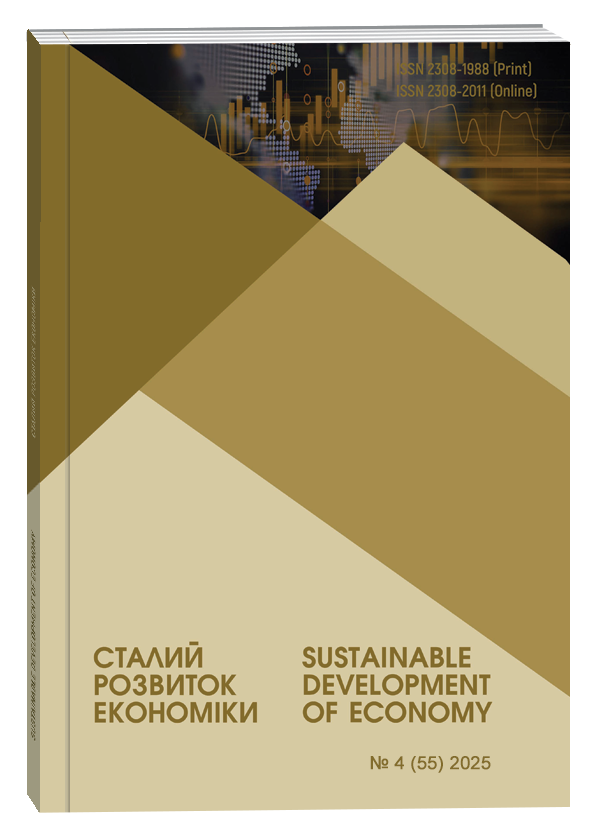RISK MANAGEMENT IN THE FUNCTIONAL MANAGEMENT SYSTEM: THE ROLE OF LEADERSHIP, CRISIS COMMUNICATIONS AND DECISION-MAKING IN THE CONTEXT OF ORGANISATIONAL CHANGE
Abstract
The article explores the integration of risk management into the system of functional management, emphasizing the crucial role of leadership, crisis communication, and effective decision-making during organizational change. The relevance of the study arises from the growing turbulence and uncertainty of the modern business environment, where companies must continuously adapt to crises, technological transformations, and unpredictable external factors. It is demonstrated that the effectiveness of risk management depends on the ability of management to identify, assess, and minimize potential threats through coordinated functional interaction and transparent communication. Leadership acts as the central driver of these processes, ensuring trust, motivation, and resilience within the organization. The study emphasizes that leaders capable of rapid adaptation, strategic vision, and emotional intelligence play a decisive role in overcoming crises and maintaining stability. The proposed conceptual model of integrated risk management combines four interrelated components: leadership, risk identification, crisis communication, and adaptive decision-making. Such integration enables a proactive approach to managing uncertainty and strengthens organizational flexibility. A key practical recommendation is the creation of a matrix risk coordination center that unites functional units for real-time communication and decision-making during crises. Crisis communication is defined as an essential management function that ensures the timely dissemination of reliable information among all stakeholders. Transparency, trust, and consistency of communication are highlighted as crucial factors for maintaining the reputation and social stability of an enterprise. In addition, the article underscores the importance of digital technologies and analytical tools for early warning, scenario modeling, and data-driven risk assessment. The study concludes that in modern conditions, risk management should not be viewed as a separate managerial function but as a systemic process integrated into all areas of organizational activity.
References
Богашко О. Л., Богашко І. О. Лідерство як інноваційний стиль управління менеджера освітньої організації. Економічні горизонти. 2024. № 1 (27). С. 87–99. DOI: https://doi.org/10.31499/2616-5236.1(27).2024.298794
Григорук С. С., Космідайло І. В. Інтеграція проджект-менеджменту, інноваційного менеджменту, контролінгу та PR як стратегія успішної реалізації інноваційних проектів. Ефективна економіка. 2025. № 5. DOI: http://doi.org/10.32702/2307-2105.2025.5.66
Дзяна Г. О., Дзяний Р. Б. Управління комунікаціями в умовах криз. Дніпровський науковий часопис публічного управління, психології, права. 2022. № 2. С. 13–21. DOI: https://doi.org/10.51547/ppp.dp.ua/2022.2.2
Захарова Н. Ю., Осипенко С. О. Трансформація бізнес-комунікацій в системі менеджменту сучасного підприємства. Збірник наукових праць Таврійського державного агротехнологічного університету імені Дмитра Моторного (економічні науки). 2024. № 1 (50). С. 77–83. DOI: https://doi.org/10.32782/2519-884X-2024-50-9
Захарчук Н., Гавловська Н., Рудніченко Є. Управління змінами: стратегічний вимір. Вісник Хмельницького національного університету. Серія: Економічні науки. 2024. № 5 (334). С. 452–456. DOI: https://doi.org/10.31891/2307-5740-2024-334-68
Пашняк Є. В., Зибарева О. В. Роль лідерства та комунікації в антикризовому управлінні організацій. The XXXI International Scientific and Practical Conference «Technologies, ideas and ways of learning development in modern conditions», August 07-09, Munich, Germany, 2023. pp. 43–46. URL: https://eu-conf.com/wp-content/uploads/2023/07/Technologies-ideas-and-ways-of-learning-development-in-modern-conditions.pdf#page=44 (дата звернення: 11.10.2025).
Пестовська З. С., Вернигора В. К. Сучасне управління персоналом: лідерство в умовах ризиків і викликів розвитку підприємства. Економічний простір. 2025. № 203. С. 209–215. DOI: https://doi.org/10.30838/EP.203.209-215
Тарасюк О. В. Управління змінами в організації: основні концепції та моделі. Економіка, управління та адміністрування. 2024. № 1 (107). С. 39–46. URL: http://eztuir.ztu.edu.ua/123456789/8455 (дата звернення: 11.10.2025).
Bohashko O. L., Bohashko I. O. (2024). Liderstvo yak innovatsiinyi styl upravlinnia menedzhera osvitnoi orhanizatsii [Leadership as an innovative management style of an educational organization manager]. Ekonomichni horyzonty – Economic Horizons, no. 1(27), pp. 87–99. DOI: https://doi.org/10.31499/2616-5236.1(27).2024.298794 (in Ukrainian)
Hryhoruk S. S., Kosmidailo I. V. (2025). Intehratsiia prodzhekt-menedzhmentu, innovatsiinoho menedzhmentu, kontrolinhu ta PR yak stratehiia uspishnoi realizatsii innovatsiinykh proektiv [Integration of project management, innovation management, controlling and PR as a strategy for successful implementation of innovative projects]. Efektyvna ekonomika – Effective Economy, no. 5. DOI: https://doi.org/10.32702/2307-2105.2025.5.66 (in Ukrainian)
Dziana H. O., Dzianyi R. B. (2022). Upravlinnia komunikatsiiamy v umovakh kryz [Communication management in crisis conditions]. Dniprovskyi naukovyi chasopys publichnoho upravlinnia, psykholohii, prava – Dnipro Scientific Journal of Public Administration, Psychology, and Law, no. 2, pp. 13–21. DOI: https://doi.org/10.51547/ppp.dp.ua/2022.2.2 (in Ukrainian)
Zakharova N. Yu., Osypenko S. O. (2024). Transformatsiia biznes-komunikatsii v systemi menedzhmentu suchasnoho pidpryiemstva [Transformation of business communications in the management system of a modern enterprise]. Zbirnyk naukovykh prats Tavriiskoho derzhavnoho ahrotekhnolohichnoho universytetu imeni Dmytra Motornoho (ekonomichni nauky) – Collection of Scientific Works of Dmytro Motornyi Tavria State Agrotechnological University (Economic Sciences), no. 1(50), pp. 77–83. DOI: https://doi.org/10.32782/2519-884X-2024-50-9 (in Ukrainian)
Zakharchuk N., Havlovska N., Rudnichenko Ye. (2024). Upravlinnia zminamy: stratehichnyi vymir [Change management: strategic dimension]. Visnyk Khmelnytskoho natsionalnoho universytetu. Seriia: Ekonomichni nauky – Bulletin of Khmelnytskyi National University. Series: Economic Sciences, no. 5(334), pp. 452–456. DOI: https://doi.org/10.31891/2307-5740-2024-334-68 (in Ukrainian)
Pashniak Ye. V., Zybareva O. V. (2023). Rol liderstva ta komunikatsii v antykryzovomu upravlinni orhanizatsii [The role of leadership and communication in crisis management of organizations]. The XXXI International Scientific and Practical Conference “Technologies, ideas and ways of learning development in modern conditions”, August 07–09, Munich, Germany, pp. 43–46. Available at: https://eu-conf.com/wp-content/uploads/2023/07/Technologies-ideas-and-ways-of-learning-development-in-modern-conditions.pdf#page=44 (in Ukrainian)
Pestovska Z. S., Vernyhora V. K. (2025). Suchasne upravlinnia personalom: liderstvo v umovakh ryzykiv i vyklykiv rozvytku pidpryiemstva [Modern personnel management: leadership in the context of risks and challenges of enterprise development]. Ekonomichnyi prostir – Economic Space, no. 203, pp. 209–215. DOI: https://doi.org/10.30838/EP.203.209-215 (in Ukrainian)
Tarasiuk O. V. (2024). Upravlinnia zminamy v orhanizatsii: osnovni kontseptsii ta modeli [Change management in an organization: main concepts and models]. Ekonomika, upravlinnia ta administruvannia – Economics, Management and Administration, no. 1(107), pp. 39–46. Available at: http://eztuir.ztu.edu.ua/123456789/8455 (in Ukrainian)


